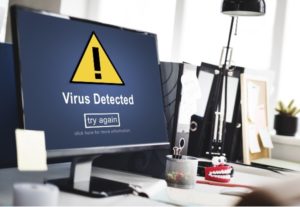
Best Methods for Securing a Computer When Working Remotely
The covid-19 pandemic shifted work from on-site to remote. However, as employees downloaded new software to enable remote work, hackers were developing new ways to capitalize on this new dynamic.
In April 2020, Google reported that it had blocked 18 million daily phishing emails and malware related to Covid-19. Even as we progress past the pandemic and settle in on remote working, we’re not safe in the remote working space.
The best way to secure your computer while working remotely is by following the best cybersecurity practices. These include using antivirus and internet security software, VPN, and avoiding public Wi-Fi. Let’s dive into the specifics.
Most Prevalent Cybersecurity Threats
One of the most prevalent threats in cyber security and remote working is phishing. According to statistics, phishing attacks spiked by over 600% in 2020 as employees started remote work.
Sadly, about 44% of organizations had not provided cybersecurity information to their staff before they started working remotely.
These phishing attacks have been the most common causes of data breaches not just for employees working from home but also for organizations.
How You Can Stay Secure
The following are ways you can protect your computer from cybercriminals.
Use Antivirus/Internet Security Software
This is one of the most effective ways to protect yourself, your organization, and other employees from cybercriminals. Consider investing in a robust antivirus suite for you and your organization.
According to statistics, by 2025, cybercrime will cost the globe around $10.5 trillion annually. Spending a few dollars on a solid antivirus suite, even for personal use, is thus one of the best investments you can make.
Antivirus and internet security software automatically secure you against cyber threats, including:
- Malware, spyware, and viruses
- Zero-day attacks
- Phishing scams, including those sent via email
- Trojan and worms

Some companies offer free yet powerful personal suites for their antivirus software, so you can still receive a decent amount of protection for zero monetary investment.
Use a Sliding Webcam Cover
Teleconferencing and video calls have become one of the most used software in remote work. These pieces of software require a webcam to work correctly. Sadly, savvy cybercriminals can use these webcams to spy on unsuspecting victims.
Modern webcams have built-in mechanisms such as a small light that shines next to the webcam to tell you when the device is active. However, hackers can still find their way around it. A sliding webcam cover is your best shield against this attack, especially if your webcam is built-in.
If you use an external webcam instead, ensure you’ve unplugged it every time you’re not using it.
Use a VPN
VPNs are useful when accessing remote applications and websites. A VPN provides a flexible connection to different services such as email, web pages, and a SQL server. Moreover, it protects your online traffic from unwanted elements such as hackers.
A VPN will protect vital information about you, such as your IP address, location, and the website you’re visiting.
However, not all VPNs are worth the money. Some VPN services only provide privacy between your computer and the VPN provider but not your browsing destination. This level of privacy is not adequate for most remote work cases.
Use Centralized Storage
Using centralized storage such as cloud storage is an excellent way of keeping your data safe as you work remotely. Cloud storage saves all your data and files on remote computers, keeping them secure in case your personal computer gets compromised in a cyberattack.
Most cloud storage service providers also encrypt the data stored in their systems for tighter security. You can access all files stored in the cloud remotely, making it easier for you and anyone else in the organization to work remotely on these files.
You should also ensure that you’ve set your computer to sync all local files to the cloud storage. That way, you have an active backup if anything happens to your computer.
Secure your Home Wi-Fi
Home Wi-Fi is the best internet connection option for anyone working remotely. You should avoid public Wi-Fi at all costs. And if you have to connect to any public hotspot, ensure you’ve encrypted your web connection somehow.
However, home Wi-Fi can still be hacked by cybercriminals if it’s not adequately secured. Ensure your home Wi-Fi has a strong password rather than the automatic password the router came with. You can also change the network’s SSID or name to make it harder for third parties to identify it.
For the SSID, avoid using identifiable names such as your home address, your name, or anything else that someone can use to identify you. Finally, ensure you’ve enabled network encryption for your home Wi-Fi.
Make Sure Passwords are Strong
According to a study, an average person has about 100 passwords. Out of these, 53% rely entirely on memory to remember them. Given the stringent password requirements, most systems need today, remembering these passwords is a tall order.
A strong password significantly helps keep cybercriminals away. The US Federal Trade Commission advises online users to have passwords at least 12 characters long with a mix of numbers, symbols, capital, and lower-case letters.
To help you remember most of these passwords, you can invest in a password management tool that will save all your other passwords under a very strong master password that you can easily remember.
Encrypt Your Data and Only Use Work Devices to Store Work-Related Information
When you encrypt data, only authorized users can be able to read it. Thus, an unauthorized user cannot make sense of it even if they intercept it. You can encrypt data when it is at rest or in transit. BitLocker is a great tool for encrypting data at rest, while the HTTPS protocol encrypts online data in transit.
You also need to ensure that you only access work-related information when using work devices. These work devices may be configured to offer more robust protection from hackers using special data encryption and other features.
Also, use software that supports end-to-end encryption for better data security and privacy.
Secure Your Remote Working Space
Cyber security will continue to be a central talking point as remote work becomes a norm for many businesses post Covid-19. Thus, start investing in the right tools and practices to keep your computer secure while you handle work online.
Consider going the automation route, making cybersecurity monitoring easier for you. You can contact a professional to get help on how you can automate the security of your remote working space.




